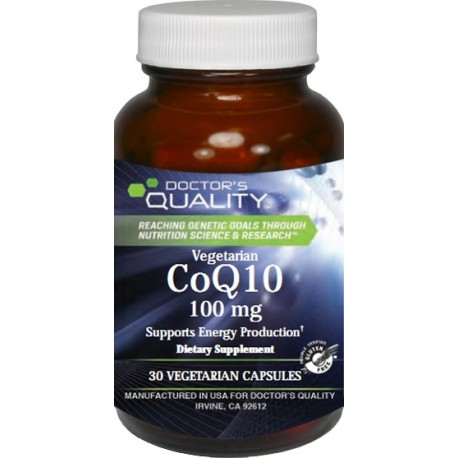No products
CoQ10 100 mg Veg Cap
New product
CoQ10 100 mg has the following benefits:
- Promotes cardiovascular health
- Provides antioxidant protection
- Supports cellular energy production
200 Items
More info
Indications
CoQ10 100 mg has the following benefits:
- Promotes cardiovascular health
- Provides antioxidant protection
- Supports cellular energy production
CoQ10 Background and Application
CoQ10, or ubiquinone, is a vitamin-like substance found in nearly all cells in the human body. Discovered in 1957, it is involved in mitochondrial oxidative phosphorylation (ATP, or energy production), scavenging antioxidants, and preventing lipid peroxidation. The highest concentrations of CoQ10 are in the heart, brain, liver, and kidney – organs with high energy requirements. Used as an approved drug for Congestive Heart Failure in Japan since 1974, many today use it for its benefits for heart health, Parkinson’s disease and antioxidant function.
Mechanisms of Action
CoQ10 is “an essential cofactor in the mitochondrial electron transport chain, where it accepts electrons from complex I and II, an activity that is vital for the production of ATP.1” Its antioxidant function protects cell membranes. It is estimated that over 60% of an oral dose of supplemental CoQ10 is excreted in the feces, and its absorption is highly dependent on food intake – namely, CoQ10 is best absorbed with concurrent intake of dietary fat. CoQ10 can enter the brain tissue. According to the PDR, “it takes about three weeks of daily dosing with CoQ10 to reach maximal serum concentrations, which then plateau with continuous daily dosing.1”
Research Summaries
CoQ10 “has been indicated in the treatment of cardiac, neurologic, oncologic and immunologic disorders2.” Research has shown that CoQ10 supplementation with 1,200 mg reduced the level of disability and slows the progressive deterioration in Parkinson’s disease patients3. Additional research demonstrates that CoQ10 appears to lower blood glucose, affect exercise tolerance, and affect learning4,5,6.
Cardiovascular Health
Research shows correlations between low serum CoQ10 levels and the severity of heart disease in patients. CoQ10 protects against oxidative damage to LDL cholesterol,1 and this may contribute to its heart health effects. LDL oxidation is known to be atherogenic. Additionally, numerous studies cite lowered blood pressure in patients with hypertension who consume supplemental CoQ10. A review of eight trials revealed a mean decrease in systolic (16 mm Hg) and diastolic (10 mm Hg) blood pressure of patients with essential hypertension receiving CoQ10 at various doses2. It also has been shown to improve clinical parameters related to Congestive Heart Failure, including dyspnea, edema and frequency of hospital admissions. Finally, many patients with high cholesterol on statin drugs exhibit lower levels of serum CoQ10 due to statin drugs’ depletion of CoQ10 levels along with lowering serum cholesterol, and may make patients with heart failure especially vulnerable.
Diabetes
CoQ10 may exert blood glucose lowering effects via lowering oxidative stress. One trial found improvement in HgbA1C levels in diabetic patients consuming 200 mg CoQ10 per day4.
Our Product
Our product provides 100 mg of CoQ10 per capsule.
Dosage
The dosage used in clinical studies is 50 to 1200 mg per day.
Specifications
Product Name: CoQ10 100 mg
Label Claim: Supports Cellular Energy Production
How Supplied: Vegetarian Capsule
Drop Count: 60ct
Product Code: VL162
References
- Physician’s Desk Reference for Nutritional Supplements, 2001.Medical Economics Company, Inc. Montvale, NJ.
- Bonakdar RA, et al. Coenzyme Q10. Complementary and Alternative Medicine 2005
- Shults CW, et al. Effects of Coenzyme Q10 in Early Parkinson Disease—Evidence of Slowing of the Functional Decline. Arch Neurol. 2002;59:1541-1550.
- Hodgson JM, et al. Coenzyme Q10 improves blood pressure and glycaemic control: a controlled trial in subjects with type 2 diabetes. European Journal of Clinical Nutrition, 2002;Nov;56(11)1137-42.
- Rosenfeldt F, et al. Systemic review of effect of coenzyme Q10 in physical exercise, hypertension and heart failure. Biofactors, 2003;18(1-4):91-100.
- McDonald SR, et al. Concurrent administration of coenzyme Q10 and alpha-tocopherol improves learning in aged mice. Free Rad Biol Med, 2005 Mar 15;38(6):729-36.




